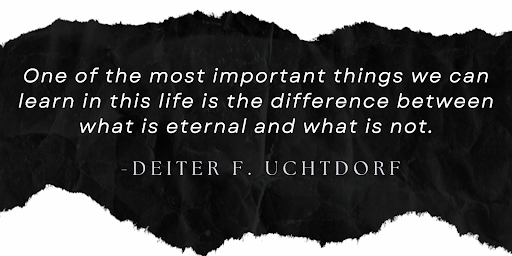
Are You Focusing on the Roots or Just the Branches of Your Faith?
Faith can flourish or fade depending on where we place our focus. While outward expressions of belief—such as Church programs, cultural traditions, or community involvement—can be meaningful, they are not the foundation of a lasting testimony. What happens when challenges come? Can a testimony built only on surface-level elements of the gospel endure the storms of life?
Strengthening the Roots of Our Faith
In his General Conference address, Nourish the Roots, and the Branches Will Grow, Elder Dieter F. Uchtdorf emphasizes that a strong testimony of Jesus Christ must be nourished at the root. He draws from his own life experiences—reflecting on his baptism 75 years ago in Zwickau, Germany, and the memories of his childhood chapel. Though that beloved building is now gone, his testimony has only deepened over time.
Using the analogy of a tree, Elder Uchtdorf explains that Jesus Christ and His Atonement are the root of our testimony. While Church practices, history, and programs are important branches, they only thrive when connected to the fundamental gospel truths. If we focus too much on the branches—be it cultural aspects of the Church, personal expectations, or historical questions—while neglecting our relationship with Jesus Christ, our testimony may weaken in times of trial.
His message is especially relevant to those who may be struggling with questions or feeling uncertain in their faith. Instead of fearing doubt, Elder Uchtdorf encourages us to seek clarity with faith in Jesus Christ—trusting that as we deepen our spiritual roots, our testimony will grow stronger, and the fruits of faith will follow.
Doctrine: Are All Gospel Truths Equal in Importance?
Misconception: Every aspect of Church doctrine and history is equally fundamental.
There’s a tendency to act as though all religious teachings carry the same weight, leading to confusion when encountering complex or unfamiliar elements of Church history or policy. This perspective can cause individuals to struggle when they find questions they don’t immediately understand.
Response:
Not all truths are of equal value. Elder Uchtdorf clarifies that while all truth is important, some principles form the very foundation of faith, while others are appendages. Quoting the Prophet Joseph Smith, he reminds us that the fundamental principles of our religion are the testimony of Jesus Christ’s Atonement, Resurrection, and divine mission—everything else is a branch connected to this root.
Common Fallacies:
False Equivalence (Assuming all elements of faith are equally essential)
-
- This fallacy occurs when different concepts are treated as having the same importance, even when they do not hold equal weight. Some mistakenly believe that every Church policy, historical event, or doctrinal interpretation carries the same eternal significance as the core truths of the gospel. Elder Uchtdorf refutes this by emphasizing that Jesus Christ and His Atonement are the root of our faith—while Church history, policies, and cultural traditions are branches. Confusing the branches for the roots can lead to unnecessary doubt when encountering difficult historical details or evolving policies. Solution: When facing challenging questions, prioritize what matters most. Ask: Does this issue change my faith in Christ’s divinity, His restored gospel, or my covenant relationship with Him? If not, keep perspective and stay anchored in the core principles that define true discipleship.
Straw Man Argument (Misrepresenting a position to make it easier to attack)
-
- This fallacy occurs when someone distorts or oversimplifies a belief in order to criticize it unfairly. Critics of the Church often focus on secondary issues—such as historical controversies, human imperfections, or Church policies—while ignoring the central message of salvation through Jesus Christ. They argue that if certain historical events or policies seem problematic, then the entire gospel message must be false. Elder Uchtdorf teaches that faith must be rooted in Christ and His Atonement—not in cultural traditions, leadership decisions, or historical details. While those topics may be interesting or even challenging, they are not the foundation of testimony. Solution: When engaging in discussions about the Church, redirect the focus to core gospel truths. Ask: Is this issue more important than my personal relationship with Jesus Christ? Recognizing that the Church’s foundation is Christ, not any one historical moment or leader, helps us avoid unnecessary spiritual crises and remain anchored in eternal truth.
Confirmation Bias (Favoring information that supports pre-existing beliefs while ignoring contrary evidence)
-
- This fallacy occurs when someone selectively focuses on evidence that aligns with their doubts or criticisms while dismissing or overlooking faith-affirming experiences and truths. A person struggling with testimony might fixate on difficult historical events, unanswered questions, or perceived flaws in Church leadership, while ignoring the profound spiritual confirmations, scriptural teachings, and personal experiences that testify of Christ’s truth. Elder Uchtdorf warns against mistaking the branches for the roots—focusing so much on secondary concerns that we neglect the fundamental truths of the gospel. Just because we encounter a question we don’t yet understand does not mean that the entire foundation of faith is invalid. Solution: When doubts arise, seek a balanced perspective. Instead of only consuming critical sources, engage with scripture, prophetic counsel, and personal spiritual experiences. Ask: Am I giving equal attention to faith-promoting evidence, or am I only reinforcing my doubts? A testimony grounded in consistent spiritual nourishment will withstand moments of uncertainty.
“If you want the branches of your testimony to grow and bear fruit, nourish the roots.” — Elder Dieter F. Uchtdorf

Defending Divine Doctrines: Faith Requires Constant Nourishment
Explanation of Doctrine:
Elder Uchtdorf teaches that faith in Jesus Christ is not something we receive once and then maintain effortlessly—it must be constantly nourished. He reminds us that faith is like a tree; if the roots are not fed with scripture study, prayer, and devotion, the branches of testimony will wither. He warns against mistaking surface-level aspects of faith for its foundation, explaining that gospel traditions and programs are valuable, but only when deeply connected to Christ.
Here’s how this doctrine defends core beliefs:
- Some critics argue that faith is irrational because it cannot be proven like a mathematical equation. But Elder Uchtdorf’s analogy shows that faith grows through experience—just as a tree’s strength is proven over time, faith is confirmed through consistent effort and personal revelation.
- Others claim that religious faith is simply inherited tradition, but Elder Uchtdorf refutes this by pointing to Korihor’s false accusations in the Book of Mormon. He reminds us that those who were not deceived by Korihor had testimonies deeply rooted in personal experience, not just tradition.
Application:
- How this teaching clarifies misunderstandings: Many leave the Church because they mistake branches (cultural practices, Church history, policies) for roots (faith in Christ). Elder Uchtdorf helps us refocus on what matters most—our personal relationship with Jesus Christ.
- Practical application:
- When discussing faith crises with others, redirect conversations to core gospel truths rather than secondary issues.
- Encourage friends and family to strengthen their testimony through personal experience with Christ, rather than relying on external validation.
Historical and Doctrinal Connections
Contextual Background:
The analogy of roots and branches in Elder Uchtdorf’s talk connects directly to Doctrine and Covenants 18, where the Lord teaches about the worth of souls and the importance of anchoring faith in Christ. In D&C 18:10, the Lord declares, “The worth of souls is great in the sight of God.” Just as Elder Uchtdorf warns against mistaking the branches of gospel culture, history, or tradition for the roots of faith, Doctrine and Covenants 18 emphasizes that our value is found in our divine identity as children of God, not in external measures.
Additionally, D&C 18:15-16 teaches that when we bring others to Christ, we experience great joy. Elder Uchtdorf’s message reinforces that when we nourish the roots of our faith—our personal relationship with Jesus Christ—we become spiritually strong enough to reach out and help others in their journey of discipleship. A testimony deeply rooted in Christ allows us to see the worth of souls more clearly and serve them with greater love and understanding.
Doctrinal Connections to Come, Follow Me:
- This week’s Come, Follow Me lesson on Doctrine and Covenants 18 aligns with Elder Uchtdorf’s message about focusing on what matters most—Jesus Christ and His Atonement. In Doctrine and Covenants 18:10, the Lord declares, “The worth of souls is great in the sight of God.” Elder Uchtdorf’s analogy of roots and branches reminds us that our faith should be deeply rooted in Christ’s love for us, rather than being shaken by surface-level concerns.
- This principle also ties into Doctrine and Covenants 18:15-16, which teaches that bringing souls to Christ is of eternal significance. Elder Uchtdorf urges us to strengthen our own testimony by focusing on our personal connection with the Savior, so that we can help others do the same. When we are rooted in Christ, we are not only strengthened ourselves but are also able to reach out and lift others who may be struggling in their faith.

Living Apologetics
Practical Application:
Faith must be actively nourished to grow and endure. Elder Uchtdorf teaches that a testimony rooted in Jesus Christ provides spiritual strength, while focusing too much on secondary issues can weaken our faith. By prioritizing our relationship with Christ, we not only strengthen our own testimony but also help others find stability in theirs.
- Reframe difficult questions by returning to core gospel truths. When discussing Church history, policy changes, or perceived contradictions, emphasize that the Church’s foundation is Jesus Christ, not any single historical event or leader. Encourage others to evaluate concerns within the broader context of Christ’s restored gospel and His mission.
- Help others distinguish between roots and branches. When someone is struggling with a faith question, guide them to focus on the Atonement of Jesus Christ first. Ask: How has Christ influenced your life? What spiritual experiences have strengthened your testimony? This helps shift their focus from peripheral concerns to personal experiences with God.
Faith in Action – share what you’ve learned –
- Discuss the “roots and branches” analogy in family or Church settings. Share Elder Uchtdorf’s insight that not all gospel truths are of equal importance and encourage others to identify which gospel principles they consider to be “roots” of their faith.
- Bear testimony of Christ in personal conversations. When friends or family members express doubts, remind them of spiritual experiences that have personally strengthened them. Help them recognize that faith is built over time and is not diminished by questions or struggles.
- Use social media to share a personal insight. Post a reflection about how deepening your faith in Christ has helped you withstand spiritual challenges. Include a quote from Elder Uchtdorf’s talk to reinforce the message.
Quick Reference: Key Defenses and Facts
Defensive Highlights:
- Faith must be actively nourished to grow. Elder Uchtdorf teaches that testimonies require ongoing effort, just like a tree needs deep roots to thrive. A neglected testimony will weaken over time, but one that is consistently strengthened will endure trials and doubts.
- Not all gospel truths are of equal importance. The Atonement of Jesus Christ is the foundation of our faith, while historical events, policies, and traditions are branches. Strengthening our faith in Christ ensures that secondary issues do not cause unnecessary spiritual crises.
- Spiritual experiences are real and transformative. Elder Uchtdorf reminds us that his testimony has grown stronger, not weaker, over time, proving that faith is deepened through experience, commitment, and personal revelation—not by relying solely on external evidence.
Conclusion
Elder Uchtdorf’s talk reminds us that faith is not something we acquire once and keep forever—it must be continuously nourished. If we actively strengthen our testimony through study, prayer, and action, we will find that even in times of doubt, our spiritual roots will hold us steady.
What small steps can you take today to nourish your faith and deepen your spiritual roots?

“Faith is beautiful because it persists even when blessings don’t come as hoped for. We can’t see the future, we don’t know all the answers, but we can trust Jesus Christ as we keep moving forward and upward because He is our Savior and Redeemer.” — Elder Dieter F. Uchtdorf
The Consider Conference series by FAIR offers an in-depth look at recent General Conference talks to help members of the Church of Jesus Christ of Latter-day Saints navigate common questions, misunderstandings, and criticisms. Each post provides doctrinal insights, historical context, and practical ways to apply gospel principles in everyday conversations. Through this series, we hope to equip readers with faith-promoting resources that encourage thoughtful reflection, respectful dialogue, and a stronger foundation in gospel truths, fostering both personal conviction and meaningful discussions with others.
The post Firmly Rooted in Christ: How to Strengthen Your Testimony and Overcome Doubt appeared first on FAIR.
Continue reading at the original source →



